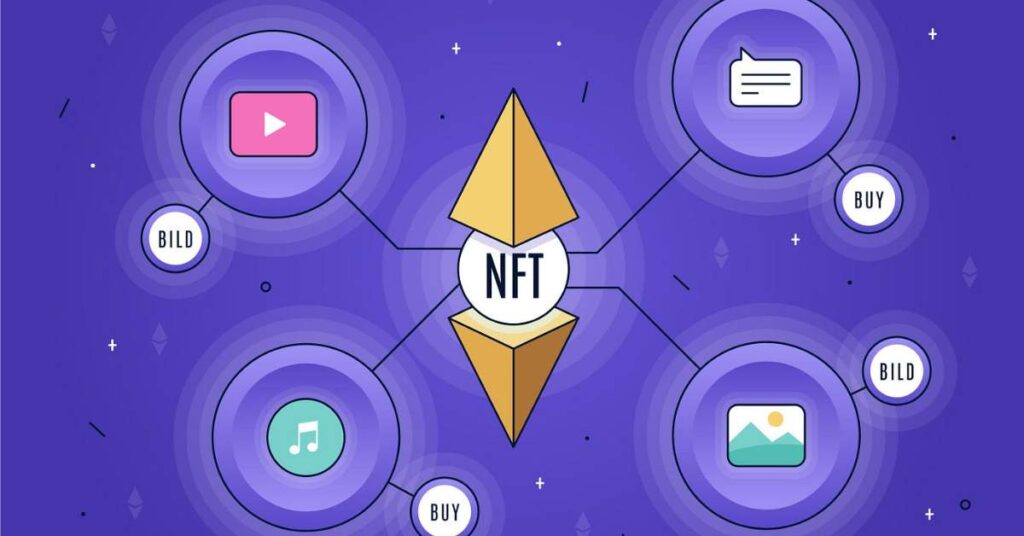Let’s break it down: non-fungible tokens (NFTs) are unique digital assets stored on a blockchain. Unlike cryptocurrencies such as Bitcoin or Ethereum, which are interchangeable and have the same value, NFTs are one-of-a-kind. Each NFT holds distinct properties that set it apart from any other token.
Contents
How Do NFTs Work?
Imagine NFTs as digital certificates of authenticity for digital or physical assets. They use blockchain technology, which is essentially a decentralized digital ledger, to record ownership and transaction history securely. This means that once an NFT is created, its ownership and provenance are permanently stored on the blockchain, making it tamper-proof and verifiable.
Creating and Owning NFTs
Creating an NFT involves minting it on a compatible blockchain platform, which could be Ethereum, Binance Smart Chain, or others. Artists, musicians, game developers, and even content creators can tokenize their work as NFTs, giving them a unique digital identity.
Owning an NFT means having control over the unique digital asset. When you purchase an NFT, you receive a digital certificate proving your ownership. This certificate contains metadata that details the asset’s characteristics, such as its creator, creation date, and any associated royalties.
What Makes NFTs Valuable?
The value of an NFT lies in its uniqueness, scarcity, and demand. Just like traditional art or collectibles, NFTs derive their worth from factors such as the artist’s reputation, the rarity of the asset, and its cultural significance.
The Rise of NFT Marketplaces
NFT marketplaces serve as platforms for buying, selling, and trading NFTs. These platforms provide visibility for creators and offer collectors a diverse range of digital assets to choose from. Some popular NFT marketplaces include OpenSea, Rarible, and Foundation.

Use Cases of NFTs
NFTs have permeated various industries, showcasing their versatility and potential. Here are some notable use cases:
- Art and Collectibles: NFTs have revolutionized the art world by allowing artists to tokenize their work and reach a global audience without intermediaries. Digital art, in particular, has seen a surge in popularity in the form of NFTs.
- Gaming: In the gaming industry, NFTs enable players to truly own in-game assets, such as characters, skins, and items. These assets can be bought, sold, and traded on NFT marketplaces, fostering a vibrant virtual economy.
- Music and Entertainment: Musicians and entertainers are leveraging NFTs to create exclusive content, concert tickets, and merchandise for their fans. NFTs offer a new revenue stream and enhance fan engagement through unique digital experiences.
- Real Estate and Virtual Worlds: NFTs are being used to represent ownership of virtual real estate and assets within virtual worlds like Decentraland and The Sandbox. This opens up possibilities for virtual commerce, social interactions, and even virtual events.
Challenges and Criticisms
Despite their growing popularity, NFTs face several challenges and criticisms:
- Environmental Concerns: The energy consumption associated with blockchain technology, particularly proof-of-work consensus mechanisms like Ethereum’s, has raised concerns about the environmental impact of NFTs.
- Copyright and Intellectual Property: NFTs have sparked debates around copyright and intellectual property rights, especially concerning the ownership and monetization of digital content.
- Market Speculation and Volatility: Like any emerging market, the NFT space is prone to speculation and volatility. Prices of NFTs can fluctuate dramatically based on trends, hype, and market sentiment.
The Future of NFTs
Despite the challenges, the future of NFTs looks promising. As blockchain technology continues to evolve and become more efficient, NFTs have the potential to disrupt traditional industries and create new opportunities for creators, collectors, and investors alike.
Conclusion
Non-fungible tokens (NFTs) represent a paradigm shift in the way we perceive and interact with digital assets. By leveraging blockchain technology, NFTs offer unique opportunities for creators to monetize their work, for collectors to own rare and valuable digital assets, and for industries to innovate and evolve.
While challenges remain, the potential of NFTs to reshape various aspects of our economy and culture is undeniable. Whether you’re an artist, a gamer, a music enthusiast, or simply curious about the future of digital ownership, NFTs invite you to explore a world of limitless possibilities.